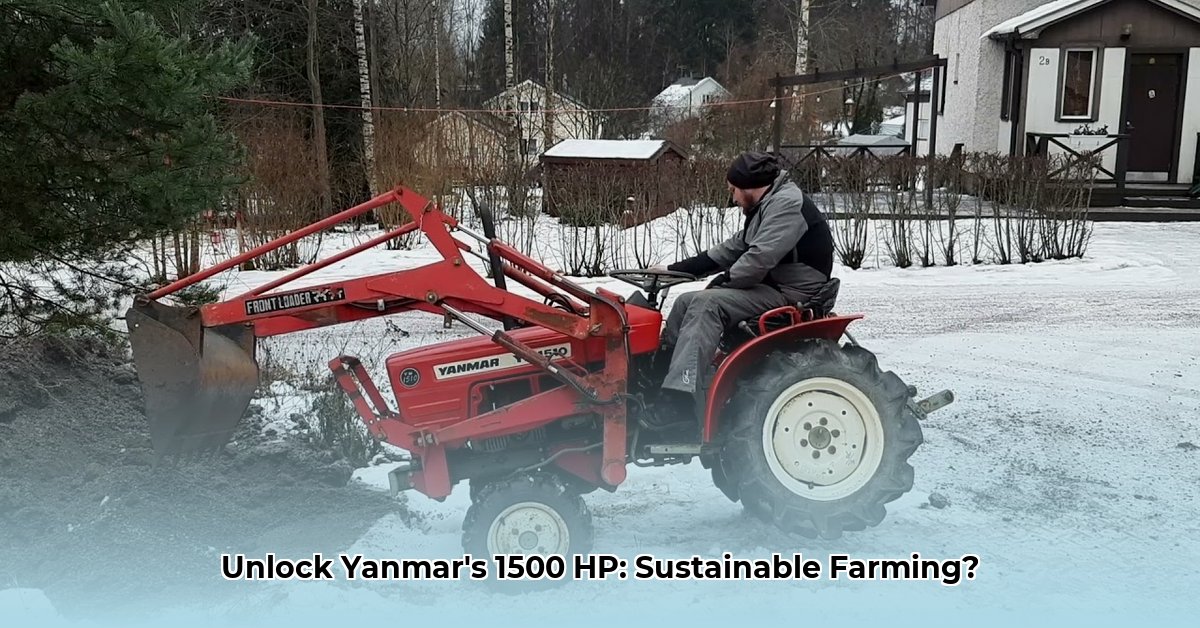
1500 Yanmar Tractor: A Retrospective Review for Sustainable Agriculture
The Yanmar YM1500 tractor, produced between 1975 and 1979, presents a compelling case study in sustainable agricultural practices—albeit one viewed through a historical lens. While lacking the technological sophistication of modern tractors, its compact design and fuel efficiency offer valuable insights into environmentally conscious farming. This review analyzes its strengths and weaknesses, considering its suitability for contemporary sustainable agriculture. For comparison with modern electric tractors, see this example.
Fuel Efficiency: A Legacy of Economy
One of the YM1500's enduring strengths is its remarkable fuel efficiency. Its 0.9-liter engine and 22-liter fuel tank minimize fuel consumption, leading to cost savings and a reduced carbon footprint. Isn't minimizing fuel consumption a key element in environmentally responsible farming? This characteristic remains relevant, even considering the advancements in fuel technology in recent decades. The lower fuel usage translates directly into economic benefits for the farmer and a smaller environmental impact.
Compact Design: Minimizing Soil Compaction
The YM1500's compact design (612-680 kg) minimizes soil compaction, a critical factor in maintaining soil health. Reduced compaction improves water infiltration and nutrient retention, leading to healthier crops and a more resilient farming system. This gentle approach to land management aligns directly with the principles of sustainable agriculture. How does the reduced soil compaction compare to that of larger modern tractors operating on the same soil type?
Technological Limitations: Facing the Realities of Age
The YM1500's age presents inherent limitations. The open operator station offers limited protection from the elements compared to the enclosed cabs of modern tractors. The manual, gear-type transmission also requires greater physical effort. Furthermore, the 15 hp (11.2 kW) engine, while sufficient for smaller tasks, may prove inadequate for heavier workloads. While charming in its simplicity, the YM1500 lacks the ease and technological advancements of its modern counterparts.
Power and Applicability to Sustainable Farming: A Balanced Perspective
The YM1500's fuel efficiency and compact design strongly support sustainable agricultural practices. However, its limited power and technological constraints must be carefully considered. It's essential to match the tractor's capabilities to the specific tasks and scale of the farming operation. While suitable for smaller farms or specific tasks, it may not be the most effective choice for larger-scale operations or intensive workloads. How can farmers effectively leverage this tractor's strengths to support their sustainable farming goals? This requires careful planning and task selection to avoid overworking the machine.
Comparing the YM1500: A Contextual Analysis
Comparing the YM1500 to modern tractors requires a nuanced approach. While the older model offers cost-effective fuel consumption, modern sustainable tractors often boast superior fuel efficiency due to technological advancements like hybrid systems or alternative fuel options. The fuel consumption per acre, longevity, maintenance costs, and overall impact on soil health must all be considered during a comparative evaluation.
Stakeholder Perspectives: Diverse Considerations
The YM1500's suitability varies depending on stakeholder perspectives:
| Stakeholder | Key Considerations |
|---|---|
| Small-Scale Farmers | Cost-effectiveness, suitability for tasks, parts availability, repair costs |
| Researchers | Comparative analysis with modern tractors, long-term impact on soil health |
| Equipment Manufacturers | Design elements, improvements for future sustainable compact tractor development |
Fuel Efficiency: A Comparative Analysis
The Yanmar YM1500's fuel efficiency, while impressive for its era, pales in comparison to modern, sustainable tractors. Modern machines often utilize advanced technologies, such as hybrid systems or alternative fuels, leading to significantly better fuel economy and reduced emissions. A direct comparison necessitates careful consideration of factors such as engine horsepower, implement size, and operating conditions to ensure accuracy.
Beyond Fuel Efficiency: A Holistic Approach to Sustainability
Sustainability extends beyond mere fuel consumption. The YM1500's compact size offers an advantage, minimizing soil compaction and improving water retention. However, newer tractors often use advanced features to improve sustainability further. These include:
- Advanced Engine Management Systems: Optimize fuel delivery and minimize emissions.
- Precision Farming Technologies: Enhance efficiency and reduce resource overuse.
- Improved Ergonomics: Reduce operator fatigue and improve work efficiency.
- Improved Drivetrain Efficiency: Minimize power loss.
Maintenance: A Crucial Element in Sustainability
The YM1500's lack of a water pump increases the risk of overheating, demanding vigilant maintenance. Modern tractors often have enhanced cooling systems and monitoring technologies that proactively identify potential issues. Comparing the maintenance costs—including parts availability and repair expenses—over the lifespan of both the YM1500 and a modern tractor is crucial to accurate sustainability evaluation.
Conclusion: A Balanced Perspective
The YM1500, although a product of its time, highlights certain aspects of sustainable farming practices. However, its limitations must be weighed against the advancements in modern sustainable tractor technology. The best choice for any farm depends on specific needs, scale, and available resources. A careful analysis of both short-term and long-term implications is critical in choosing the most appropriate equipment.